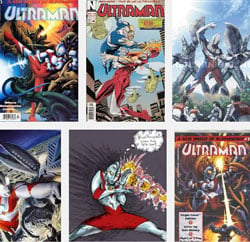Malaysia bans Japanese comic book Ultraman for using 'Allah'

The home ministry, which is in charge of domestic security and censorship, said the Malay language edition of "Ultraman, The Ultra Power" contains elements that can undermine public order and morals.
"Ultraman is an idolised by many children," and equating him with Allah will "confuse Muslim youth and damage their faith," it said.
It further warned that irresponsible use of the word could provoke Muslims and threaten public safety.
The Malaysian government is currently embroiled in an intense court battle with the Catholic Church over the use of the word "Allah" by non-Muslims, in a case that has raised religious tensions in the majority Muslim country.
Ultraman is a fictional Japanese superhero who fights skyscraper-sized "Kaiju" (monsters), and first appeared on television in the 1960s.
The comic gained popularity worldwide, including in Malaysia, where versions dubbed in Malay were screened on TV and comic books translated into the national language.
Oversensitive?
The home ministry said other Ultraman comic books were unaffected and that only this edition is banned.
The decision has led to widespread ridicule among Malaysian Facebook and Twitter users, including from Youth and Sports Minister Khairy Jamaluddin, who asked "Apa salah Ultraman? (What wrong did Ultraman do?)"
The controversial line can be seen in an image available on social media that describes Ultraman: "He is considered, and respected, as Allah or the Elder to all Ultra heroes."
The ban is enforced under the Printing Presses and Publications Act, a much-criticised law that gives authorities wide-ranging powers over printed material, which was also used to bar the Catholic Church from using "Allah" in its publications.
The home ministry in 2007 threatened to revoke the publishing permit of the Herald, the Catholic Church's newspaper, for using the word in its Malay edition, leading to a seven-year legal battle that has raised religious tensions.
The church is currently seeking leave from the nation's highest court to challenge a lower court's ruling last October that sides with the government.
The tussle has led to a wider struggle over whether the word can be used by non-Muslims in their translated scripture or other practices of worship.
Source: AFP, via I-Net Bridge
Source: I-Net Bridge

For more than two decades, I-Net Bridge has been one of South Africa’s preferred electronic providers of innovative solutions, data of the highest calibre, reliable platforms and excellent supporting systems. Our products include workstations, web applications and data feeds packaged with in-depth news and powerful analytical tools empowering clients to make meaningful decisions.
We pride ourselves on our wide variety of in-house skills, encompassing multiple platforms and applications. These skills enable us to not only function as a first class facility, but also design, implement and support all our client needs at a level that confirms I-Net Bridge a leader in its field.
Go to: http://www.inet.co.za





